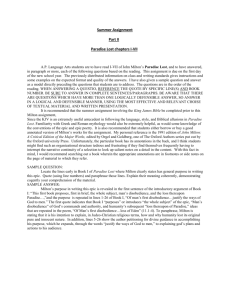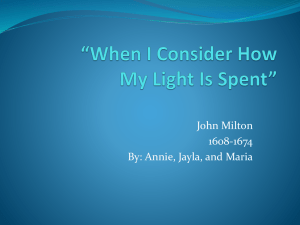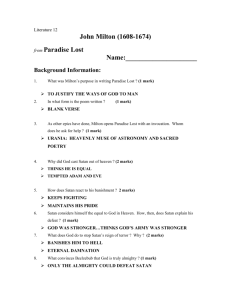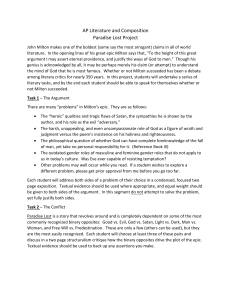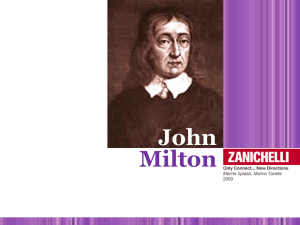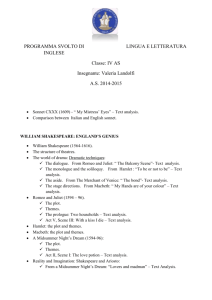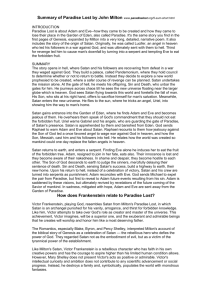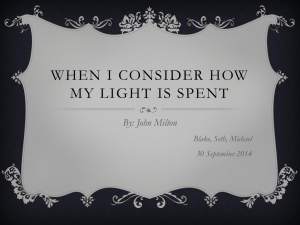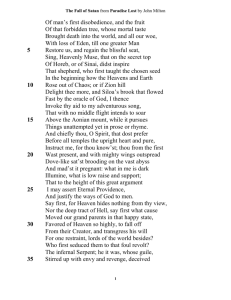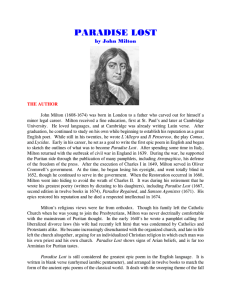JOHN MILTON - marilenabeltramini.it
advertisement
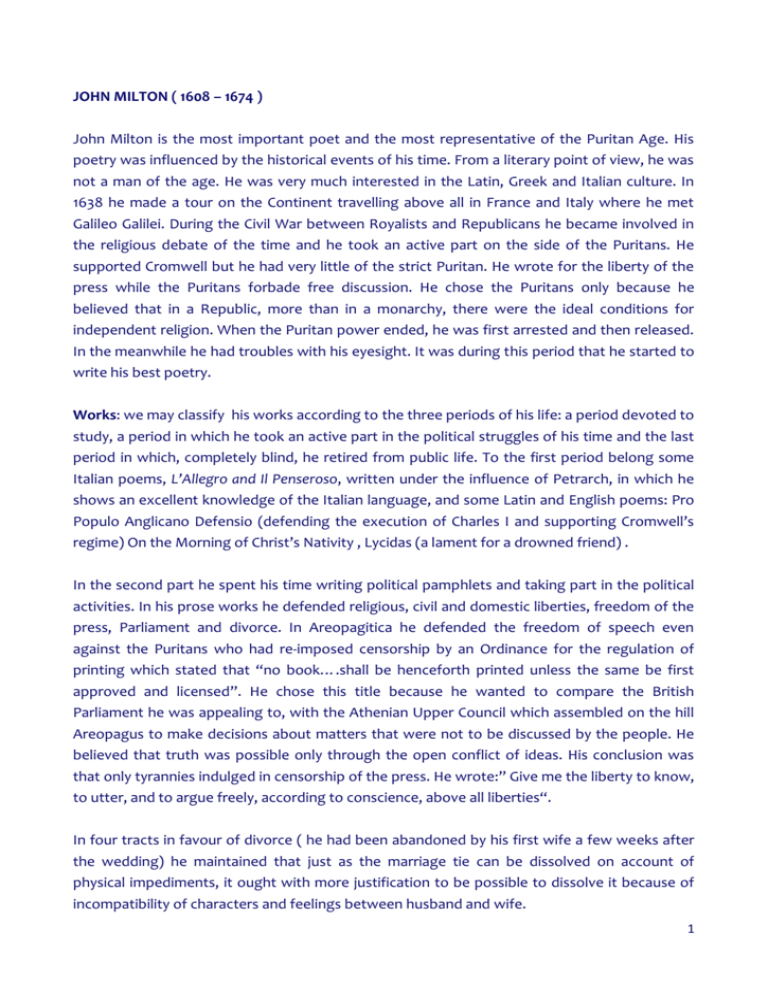
JOHN MILTON ( 1608 – 1674 ) John Milton is the most important poet and the most representative of the Puritan Age. His poetry was influenced by the historical events of his time. From a literary point of view, he was not a man of the age. He was very much interested in the Latin, Greek and Italian culture. In 1638 he made a tour on the Continent travelling above all in France and Italy where he met Galileo Galilei. During the Civil War between Royalists and Republicans he became involved in the religious debate of the time and he took an active part on the side of the Puritans. He supported Cromwell but he had very little of the strict Puritan. He wrote for the liberty of the press while the Puritans forbade free discussion. He chose the Puritans only because he believed that in a Republic, more than in a monarchy, there were the ideal conditions for independent religion. When the Puritan power ended, he was first arrested and then released. In the meanwhile he had troubles with his eyesight. It was during this period that he started to write his best poetry. Works: we may classify his works according to the three periods of his life: a period devoted to study, a period in which he took an active part in the political struggles of his time and the last period in which, completely blind, he retired from public life. To the first period belong some Italian poems, L’Allegro and Il Penseroso, written under the influence of Petrarch, in which he shows an excellent knowledge of the Italian language, and some Latin and English poems: Pro Populo Anglicano Defensio (defending the execution of Charles I and supporting Cromwell’s regime) On the Morning of Christ’s Nativity , Lycidas (a lament for a drowned friend) . In the second part he spent his time writing political pamphlets and taking part in the political activities. In his prose works he defended religious, civil and domestic liberties, freedom of the press, Parliament and divorce. In Areopagitica he defended the freedom of speech even against the Puritans who had re-imposed censorship by an Ordinance for the regulation of printing which stated that “no book….shall be henceforth printed unless the same be first approved and licensed”. He chose this title because he wanted to compare the British Parliament he was appealing to, with the Athenian Upper Council which assembled on the hill Areopagus to make decisions about matters that were not to be discussed by the people. He believed that truth was possible only through the open conflict of ideas. His conclusion was that only tyrannies indulged in censorship of the press. He wrote:” Give me the liberty to know, to utter, and to argue freely, according to conscience, above all liberties“. In four tracts in favour of divorce ( he had been abandoned by his first wife a few weeks after the wedding) he maintained that just as the marriage tie can be dissolved on account of physical impediments, it ought with more justification to be possible to dissolve it because of incompatibility of characters and feelings between husband and wife. 1 In the last period he spent the rest of his life in blindness and poverty, dictating his verses to his daughter. To this period belong Paradise Lost, Paradise Regained, a short epic poem which tells of Christ’s victory over the temptation by Satan in the desert, and Samson Agonistes, a tragedy dealing with the biblical story of Samson and the Philistines. Paradise Lost is a secondary/literary epic poem ( primary epic is oral, for instance Beowulf, Iliad and Odyssey). It is about Satan’s rebellion against God. He believed God was a tyrant. It retells the story of the loss of the garden of Eden as narrated in the book of Genesis and revolves around one great theme: the rebellion against God. It consists of two dramas linked with the failure of the Puritan Revolution: the divine drama of the fall of the Angels and the human drama of the fall of Adam and Eve. Milton wants to warn against the sin of pride. Both Satan and Adam and Eve had the ambition to become equal to God. They challenged God and were defeated. The whole meaning of the divine drama is summoned up in the figure of Satan. SATAN’S SPEECH `Is this the region, this the soil, the clime,’ Said then the lost archangel, `this the seat That we must change for heav’n, this mournful gloom For that celestial light? Be it so, since he Who now is sovran can dispose and bid What shall be right: furthest from him is best Whom reason hath equalled, force hath made supreme Above his equals. Farewell happy fields Where joy for ever dwells: hail horrors, hail Infernal world, and thou profoundest hell Receive thy new possessor: one who brings A mind not to be changed by place or time. The mind is its own place, and in itself Can make a heaven of hell, a hell of heaven. What matter where, if I be still the same, And what I should be, all but less than he Whom thunder bath made greater? Here at least We shall be free; the almighty hath not built Here for his envy, will not drive us hence: Here we may reign secure, and in my choice To reign is worth ambition though in hell: Better to reign in hell, than serve in heaven. 2 These lines are taken from Book I. Satan is surveying his new home trying to become aware of the new situation after his downfall. Satan and the Rebel Angels had fallen down through space ”Nine times the Space that measures Day and Night” before landing in hell. Satan compares the new world to Paradise and feels lost because everything is different here: “the region, the soil, the clime“; there is only “a mournful gloom” all over the place instead of the “celestial light” of the Paradise. He is not glad at first to be there, but he soon rejects despair and accepts the new situation: “Be it so…. Farewell happy fields where joy for ever dwells: hail horrors, hail infernal word”. In the following lines Satan shows all his ambition, all his selfconfidence and determination. He realizes that now he is the “new possessor” of a place where “ farthest from him( God)…. at least we shall be free….and….may reign secure”. His ambition is to have a reign somewhere, no matter if that place is gloomy and horrible. He is great in the self-assurance of his strength: he has got “a mind not to be changed by place or time”, a mind that “ can make a Heaven of Hell, and a Hell of Heaven”. Then hell and heaven are only states of mind. Milton’s hell is not a real place! Hell is in the mind because the mind can change the external world: if we live in a Paradise but our mind perceives it as a hell, that place will be hell and vice versa. Satan is the real hero of Paradise Lost; he shows all the characteristics that Milton admired: courage, pride, oratorical power, self-confidence, ambition and so on.He is great in the selfassurance of his strength and in his contempt of the pain that has been inflicted on him. He also embodies Milton’s Puritan ideals of independence and liberty since he is seen as a rebel fighting against the absolute power of a tyrannical God, just as Milton, defender of liberties, struggles his battle against a despotic king. As Blake said, “Milton is on the Devil’s party without knowing”. He feels equal to God in reason and inferior only in power. When God banishes him from Heaven, he feels himself injured and wants to take a revenge against him, corrupting His new creation: man. He succeeds in his task and in the form of a snake, he persuades Eve to eat an apple from the forbidden tree of knowledge. Satan is ambitious. He is very proud and his boundless pride makes him believe that it “is better to reign in Hell, than serve in Heaven”. He has got the traits of the great military leaders and tries and succeeds in giving courage to his depressed soldiers after a defeat. The rebellious element in Milton’s Satan was later to influence the Romantic poets in the conception of the “satanic hero”, a lonely outsider who struggles against everything and everybody, isolated from the rest of mankind. In the Byronic Hero we can find many traits of Milton’s Satan. Even if Satan is the central figure in the passage, the presence of God is always felt. Satan never directly names him, but God is always in his thoughts. He feels to be equal to God in reason; he is inferior to him only in the power because God possesses the strength:” what reason has equalled, thunder hath made greater”. He considers himself to be only “less than he”. Satan despises the pain inflicted on him, but he seems frustrated because he is aware of 3 God’s superiority: he refers to God calling him “ the Almighty” ,he admits that “ he who now is Sovran can dispose and bid what shall be right”. The language of the passage, direct and forceful, has the characteristics of the best oratory full of memorable phrases. ON HIS BLINDNESS When I consider how my light is spent, Ere half my days, in this dark world and wide, And that one Talent which is death to hide Lodged with me useless, though my Soul more bent To serve therewith my Maker, and present My true account, lest he returning chide; “Doth God exact day-labour, light denied?” I fondly ask. But patience, to prevent That murmur, soon replies, “God doth not need Either man’s work or his own gifts; who best Bear his mild yoke, they serve him best. His state Is Kingly. Thousands at his bidding speed And post o’er Land and Ocean without rest: They also serve who only stand and wait.” This sonnet was written when Milton had become blind. It consists of an octave and a sestet like a Petrarchan sonnet , but differs from it in the rhyme scheme of the sestet which is CDE CDE instead of CDC DCD. Further, he made no separation between the octave and the sestet. The Volta is stressed by a run-on-line: “ But Patience, to prevent/that murmur…” (ll. 8-9). The sonnet illustrates the importance of religion in the Puritan Age .The main theme of the poem is of course blindness. Milton’s attitude to blindness in the octave is different from the one in the sestet: in the former there is complaint and despair about it while in the latter there is acceptance and resignation. In the octave Milton complaints about blindness, even if it has been given by God, because he can’t serve Him well. He feels frustrated because he is aware that he has got talent lying inside him, but he is also aware that he can’t use it because of blindness “one Talent …. lodg’d with me useless” . He complaints about that because his “ soul is more bent to serve therewith My Maker”. He wants to “present a true account of myself” for fear that God “returning” on Doomsday may reproach him. The question he asks is whether God requires day-labour even of those who are blind. The answer is given in the sestet. Man is not saved by works or good actions as for Catholics but by his faith alone :”God doth not need 4 either man’s work or his own gifts” they also serve who only stand and wait”. According to the Puritans, men’s purpose in life is to serve God. The best way to serve God is to accept “His mild joke” , that is to do His will. Following His directions, their joke becomes mild and they can be directed in the right way and “serve Him best”. The term “Talent” in the third line alludes to the Biblical Parable of the Talents in Saint Mathew’s Gospel: three servants were given some coins by their master. The first two doubled them, while the third buried them in the earth and was punished for not using them. Milton identifies himself with the third because his “Talent …..lodged with me useless”. The sonnet contains some figure of speech. There is a personification of Patience in line 5 and an alliteration in /d/ (days-dark) and in /w/ ( world-wide) in line 2. There are also some metaphors: light which stands for sight in line 1, Talent which stands for genius in line 3 and day-labour which stands for work in line 7. The octave has got a particular syntactic structure: the main clause, “I fondly ask”, which is in line 8, is preceded by subordinate clauses. Adapted from<http://rosariomariocapalbo.wordpress.com/2013/10/08/john-milton-paradiselost-satans-speech/> 5

